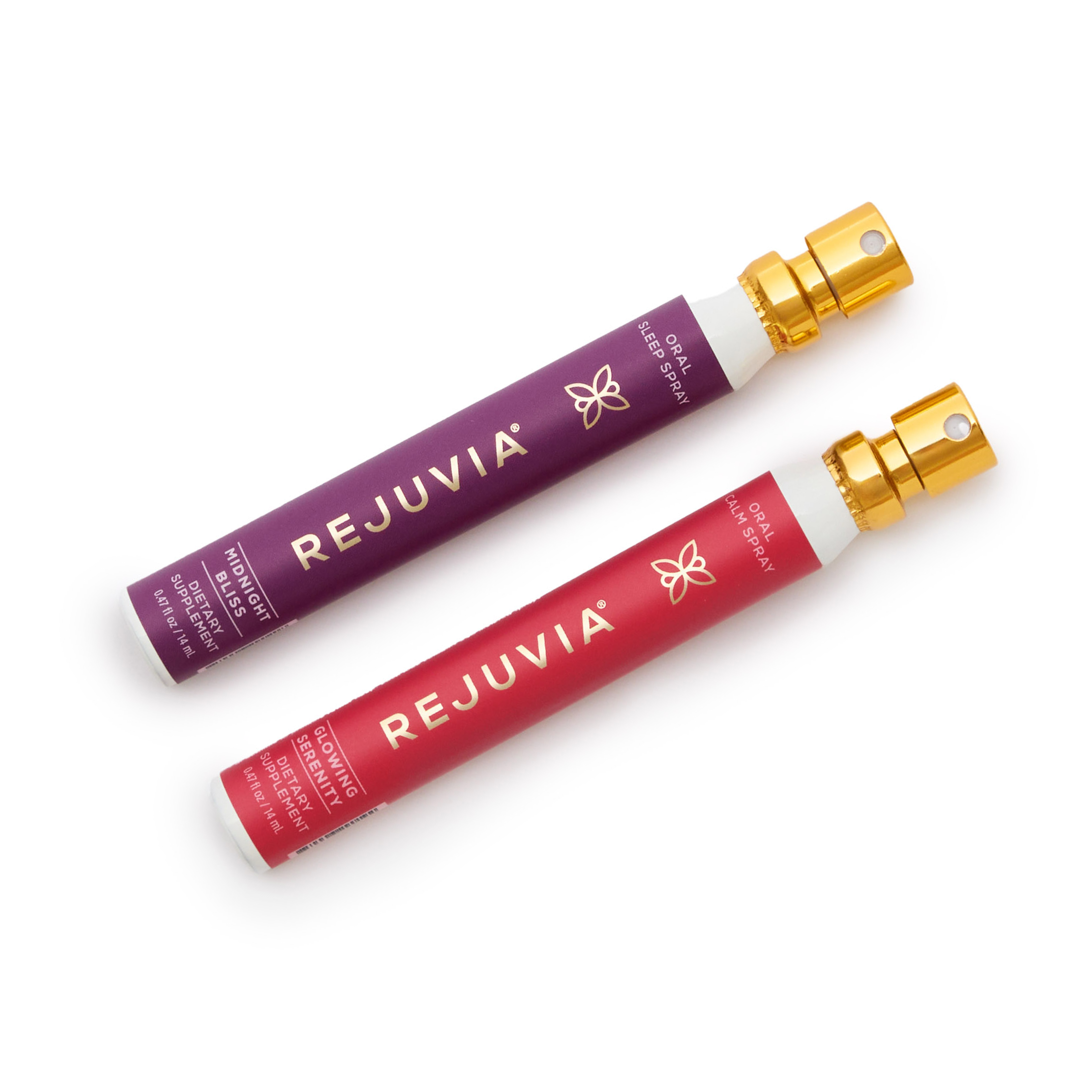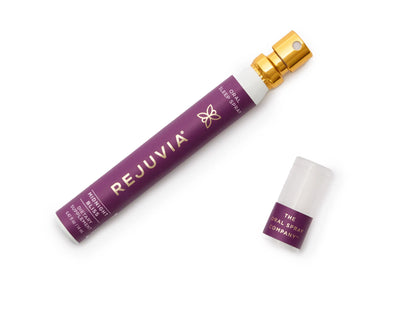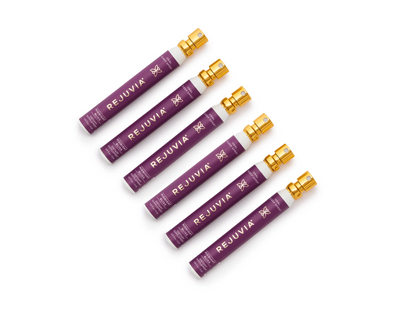Stress and sleep are closely connected. High stress raises cortisol levels, disrupting sleep, while poor sleep increases stress. Breaking this cycle is crucial for better health. Here’s how you can naturally manage stress and improve sleep:
- Mindfulness & Meditation: Techniques like 4-7-8 breathing, body scans, and yoga nidra calm the mind and improve sleep cycles.
- Movement-Based Activities: Low-impact exercises like yoga, tai chi, walking, and swimming ease tension and lower stress hormones.
- Herbal Remedies & Supplements: Options like valerian root, chamomile, magnesium, and melatonin support relaxation and sleep.
- Fast-Acting Sprays: Products like Rejuvia's Calm Spray and Sleep Spray offer quick relief through sublingual absorption.
- Lifestyle Adjustments: Better sleep hygiene, consistent routines, social connections, time outdoors, and journaling reduce stress over time.
Takeaway: Start small with daily mindfulness, light exercise, or adding a natural supplement. Consistency is key to creating a positive cycle of lower stress and better sleep.
Stress Management: 5 Ways To Relieve Stress Naturally
Mindfulness and Meditation Techniques
Mindfulness and meditation have evolved from ancient traditions into widely accepted methods for managing stress, with their benefits now supported by science. These practices help train your mind to stay in the moment, steering it away from worries and the endless cycle of tasks.
The Science Behind Mindfulness
Practicing mindfulness regularly can bring about fascinating changes in the brain. It reduces activity in the amygdala - the part of the brain linked to stress - and strengthens the prefrontal cortex, which is responsible for decision-making and emotional regulation. This combination lowers cortisol levels and activates the parasympathetic system, promoting a state of relaxation often referred to as "rest-and-digest."
Mindfulness meditation also helps regulate your circadian rhythm, making it easier to fall asleep and stay asleep. Studies suggest that consistent meditation can lead to quicker sleep onset and deeper, more restorative sleep cycles. One reason for this is its impact on the brain’s default mode network, which is active when your mind wanders or engages in self-referential thoughts. By quieting this network, mindfulness reduces mental chatter and worry, creating space for genuine relaxation.
Daily Mindfulness Practices
The beauty of mindfulness is its flexibility - you can practice it anytime, anywhere, without needing special tools or a lot of time. Guided meditations are a great starting point, especially for beginners. Apps like Insight Timer offer a variety of options, from quick 5-minute breathing exercises to longer body scan sessions.
Breathwork is another simple yet powerful technique. The 4-7-8 breathing method - inhaling for 4 counts, holding for 7, and exhaling for 8 - can stimulate the vagus nerve, helping you relax almost instantly. It’s an easy tool to use in moments of stress.
Progressive muscle relaxation is another effective practice. By tensing and then releasing muscle groups from your toes to your head, you can release hidden tension, especially in areas like your shoulders, neck, or jaw.
Yoga nidra, often called "yogic sleep", is a guided meditation that brings you to the edge of sleep while keeping you aware. Sessions typically last 20 to 45 minutes and can leave you feeling deeply refreshed. Similarly, body scan meditations guide you to focus on each part of your body, helping you identify and release any lingering tension.
A consistent mindfulness practice not only reduces stress but also improves sleep quality over time.
Building a Mindfulness Routine
The key to reaping the benefits of mindfulness is consistency. Short daily sessions - just 10 to 15 minutes - are often more impactful than a single long session once a week. Many people find it helpful to pair meditation with existing habits, like practicing right after morning coffee or before an evening shower.
Start small, with just five minutes, and gradually extend your practice. The goal isn’t to empty your mind completely but to gently bring your focus back to your breath or bodily sensations whenever it wanders.
Morning meditation can help you start the day with a calm and clear mindset, while evening sessions can ease the transition into rest. Establishing a dedicated space for meditation - a quiet corner with a comfortable chair or cushion - can signal to your brain that it’s time to relax. Enhancements like lighting a candle or playing soft music can make the experience even more soothing.
The most important thing is finding a routine that works for you. Whether it’s sitting quietly, walking mindfully, or following a guided session, the focus should be on creating a sustainable practice that helps you manage stress and improve your sleep.
Movement-Based Stress Relief Methods
Building on mindfulness techniques, movement-based methods tap into your body's natural ability to relax. Low-impact exercises are particularly effective at reducing stress and improving sleep by triggering this relaxation response. These activities work by easing muscle tension and lowering cortisol levels, creating the perfect conditions for restorative sleep. Plus, they're gentle on joints and muscles, making them suitable for people of all fitness levels.
Low-Impact Exercises for Stress Relief
Yoga, tai chi, and qigong combine gentle movements with mindful breathing to promote relaxation. Yoga focuses on controlled postures and steady breathing, helping to calm the mind and body. Tai chi involves slow, deliberate movements that improve balance and mental focus, while qigong blends movement and breathwork to encourage a sense of calm. These practices are known to sharpen mental clarity, support physical health, boost emotional well-being, and even strengthen the immune system. Beyond these structured exercises, everyday activities can also provide rhythmic movements that soothe the mind.
Rhythmic Activities for Mental Clarity
Walking is one of the simplest ways to reduce stress and improve sleep. Many American neighborhoods feature sidewalks and parks, making walking an easy and accessible option. Swimming offers another excellent low-impact exercise, with the buoyancy of water easing joint pressure. Local pools and community centers often host lap swimming or water-aerobics sessions. Cycling, whether outdoors or on a stationary bike, also provides rhythmic motion that enhances mental clarity and promotes overall well-being.
Exercise Duration Guidelines
Consistency is the secret to making movement a lasting part of your routine. Regular low-impact exercises can lead to better sleep, reduced fatigue, and improved focus over time. Whether you prefer a continuous session or breaking it into smaller segments, the key is sticking with it. Pay attention to your body's signals and adjust your routine as needed. These movement-based methods naturally complement other stress-relief strategies, working together to improve sleep quality and overall wellness.
Herbal Remedies and Fast-Absorbing Natural Supplements
In addition to movement and mindfulness practices, natural herbal remedies and supplements can help ease stress and promote restful sleep. These remedies work to support the body’s natural chemistry, encouraging relaxation and improving sleep quality.
Popular Herbal Options
For centuries, herbal traditions have relied on certain botanicals for their calming effects. Here are some commonly used herbs:
- Valerian Root: Known for its potential to promote relaxation, valerian root may influence neurotransmitters like GABA, helping to create a sense of calm.
- Chamomile: Often enjoyed as a tea, chamomile is cherished for its gentle, soothing properties that can help reduce stress, particularly before bedtime.
- Lavender: With its calming aroma, lavender is a popular choice for creating a relaxing environment, whether used in a diffuser or applied topically in diluted form.
- Passionflower: Traditionally used to ease nervous tension and restlessness, passionflower is sometimes combined with other herbs to enhance its calming effects.
These herbs can be a natural way to support a deeper, more restorative sleep cycle.
The Role of Melatonin and Magnesium
In addition to herbs, supplements like melatonin and magnesium play a key role in improving sleep and relaxation.
- Melatonin: This hormone helps regulate the body’s sleep-wake cycle. In the U.S., melatonin is available as a dietary supplement and can be particularly helpful for those whose natural melatonin production is disrupted.
- Magnesium: Essential for muscle relaxation and stress regulation, magnesium is a critical nutrient that many people don’t get enough of through diet alone. Magnesium glycinate, known for its high absorption and gentle effect on the stomach, is a popular choice for supplementation.
When choosing supplements, it’s important to look for products that comply with FDA labeling standards and are third-party tested for quality.
Rejuvia's Calm Spray and Sleep Spray

If swallowing pills isn’t your thing or you’re looking for quicker relief, Rejuvia offers an innovative solution. Their oral sprays bypass the digestive system, delivering active ingredients directly into the bloodstream through sublingual absorption. This method ensures faster effects compared to traditional capsules or tablets, which can take 30–60 minutes to kick in.
Rejuvia's Calm Spray and Sleep Spray are designed for rapid relief, offering a mint-flavored, customizable dosing system. Each $39 bottle contains 30 servings and is non-habit forming, triple lab-tested, vegan, and non-GMO. For a more comprehensive wellness approach, their $75 Starter Kit includes both sprays along with Vitamin D3+K2 and Lutein sprays.
This fast-absorbing delivery system is particularly helpful for those who struggle with swallowing pills or need immediate relief during moments of heightened stress.
sbb-itb-de8e20a
Lifestyle Changes for Stress and Sleep
Your daily habits play a big role in managing stress and improving sleep. By making small but meaningful changes, you can align your routine with your body’s natural need for rest and relaxation.
Improving Sleep Hygiene
Creating the right environment and routine for sleep can make a world of difference. Start by keeping your bedroom cool - this helps your body settle into sleep more easily. Also, turn off screens at least an hour before bed. The blue light from devices can interfere with melatonin, the hormone that helps you sleep. To further enhance your sleep space, consider blackout curtains, an eye mask, or even a white noise machine to block out distractions.
Another key is sticking to a consistent sleep schedule. Going to bed and waking up at the same time every day helps regulate your internal clock, making it easier to fall asleep and wake up feeling refreshed. Simple habits like practicing mindfulness or doing light exercises can also support your body’s natural rhythm. And remember: your bedroom should be a sanctuary for rest - reserve it for sleep and personal time only. This reinforces the mental connection between your bed and relaxation.
The Importance of Social Connection
Building and maintaining strong social ties isn’t just good for your mood - it’s also a powerful stress reliever. Spending time with friends or family helps ease anxiety and lifts your spirits. Joining community activities, whether it’s volunteering, joining a club, or playing a sport, can offer a sense of belonging and a break from daily pressures.
Even having a small group of trusted people to lean on can make a big difference. It’s equally important to set healthy boundaries in your relationships. Learning to say no to overcommitting and addressing conflicts early on can prevent stress from piling up and disrupting your sleep.
Nature Time and Journaling
Spending time outdoors is another simple yet effective way to reduce stress. Whether it’s a walk in the park or tending to a garden, being in nature offers a refreshing escape from daily routines and helps boost your mood.
Journaling is another great tool, especially before bed. Writing down your thoughts can help clear your mind of worries, making it easier to wind down and transition into a peaceful night’s sleep. It’s a small habit that can have a big impact on your overall well-being.
Comparison Table: Methods, Benefits, and Ease of Use
Method Comparison Overview
Here’s a breakdown of different stress management methods, their advantages, and how easy they are to adopt. This can help you decide which approach fits your lifestyle and specific stressors.
| Method | Primary Benefits | Ease of Use | Best For |
|---|---|---|---|
| Mindfulness & Meditation | Enhances sleep quality, reduces insomnia, fatigue, and depression | Needs consistent practice and learning | Managing long-term stress |
| Movement-Based Activities | Balances the internal clock, eases the mind, lowers stress hormones, and increases endorphins | Accessible with regular effort | Improving physical and mental well-being |
| Herbal Remedies | Provides gentle, natural support - melatonin aids circadian rhythm regulation, and magnesium may improve sleep | Easy to incorporate into daily routines | Gradual and steady relief |
| Fast-Absorbing Sprays | Delivers quick stress relief and helps with faster sleep onset | Extremely simple with adjustable dosing (e.g., Rejuvia's Calm Spray and Sleep Spray) | Immediate and convenient relief |
| Lifestyle Changes | Encourages overall wellness through healthier habits that improve sleep | Requires time and dedication | Long-term, sustainable results |
Let’s take a closer look at each approach:
- Mindfulness and Meditation: These practices not only improve sleep but also help you manage negative emotions by activating your body’s natural relaxation response. However, they require regular practice to see results.
- Movement-Based Activities: Exercise and movement help sync your internal clock, calm your mind, and reduce stress hormones. While effective, they demand consistent time and effort.
- Herbal Remedies: Natural options like melatonin and magnesium offer subtle support for sleep and stress. They’re easy to add to your routine but tend to work gradually over time.
- Fast-Absorbing Sprays: Products like Rejuvia's Calm Spray and Sleep Spray stand out for their rapid absorption and adjustable dosing, making them ideal for quick relief.
- Lifestyle Changes: While they require commitment, changes like better sleep hygiene and healthier habits lay the groundwork for lasting stress relief and improved sleep quality.
Using a combination of these methods can offer both short-term relief and long-term benefits, giving you the flexibility to address stress from multiple angles.
Conclusion: Natural Solutions for Stress and Sleep
Reducing stress and improving sleep often go hand in hand, and combining a variety of natural methods can address both immediate challenges and long-term wellness goals.
Start small - maybe with 5 minutes of mindfulness, a 20-minute walk, or adding magnesium to your nighttime routine. These simple steps can lay the groundwork for more personalized strategies. Some days, quick solutions like Rejuvia's Calm Spray might be just what you need, while other times, a longer yoga session or journaling could be the perfect way to unwind. Having a mix of tools at your disposal allows you to respond to whatever the day throws your way.
Rejuvia's Sleep Spray and Calm Spray are designed for flexibility, offering adjustable dosing and quick absorption. For $39, each bottle provides 30 servings, making it an easy addition to your routine when you need fast relief.
Consistency is key. A daily 10-minute practice often yields better results than occasional longer sessions. The same goes for supplements - taking magnesium every night is far more effective than using it sporadically. This steady approach builds a strong foundation for managing stress and improving sleep.
The link between stress relief and better sleep creates a powerful cycle. When you handle stress more effectively during the day, your sleep naturally improves. In turn, quality sleep helps you face the next day with greater resilience. This positive feedback loop can become the cornerstone of your well-being, setting you up for a healthier, more balanced life in 2025 and beyond.
FAQs
What are some simple ways to add mindfulness and meditation to my daily routine for reducing stress and improving sleep?
Incorporating mindfulness and meditation into your everyday life doesn’t have to be complicated. Dedicate 10–15 minutes a day to simple practices like mindful breathing, a body scan, or giving your full attention to a single task. Choosing a consistent time - whether it’s in the morning or before bed - can help make this a regular part of your routine.
These mindfulness exercises can work wonders for calming your mind, reducing stress, and setting the stage for better sleep. Over time, they encourage relaxation and support overall well-being, helping you unwind and enjoy more peaceful nights.
What are the benefits and possible side effects of using herbal remedies like valerian root and chamomile for stress relief?
Valerian root is a popular choice for promoting relaxation and may help you drift off to sleep more quickly. That said, it can sometimes lead to mild side effects like headaches, dizziness, an upset stomach, vivid dreams, or even a sense of mental fog. Another well-loved option is chamomile, known for its calming effects and its ability to improve sleep. While generally safe, chamomile can occasionally cause mild issues such as nausea or allergic reactions in some individuals.
Both valerian root and chamomile can support stress relief, but they should be used with care. This is especially true if you're pregnant, nursing, or taking any medications. It's always a good idea to check with a healthcare provider before adding new remedies to your routine.
How do Rejuvia's Calm Spray and Sleep Spray provide faster stress relief compared to traditional supplements?
Rejuvia's Calm Spray and Sleep Spray are crafted to act fast by delivering their active ingredients directly through the mucous membranes in your mouth, usually under the tongue. This direct method allows the ingredients to skip the digestive system entirely, entering your bloodstream more quickly. As a result, you can typically feel the effects within 15–20 minutes.
On the other hand, traditional supplements need to go through the digestive system, which can delay their effects by 30 minutes to several hours. This makes Rejuvia's sprays a more efficient choice for anyone seeking rapid stress relief or better sleep.
Related Blog Posts
- Why You Can't Sleep: 8 Common Causes
- Complete Guide to Better Sleep Naturally
- 5 Ways Stress Ruins Your Sleep Quality
- Checklist for a Sleep-Optimized Bedroom





